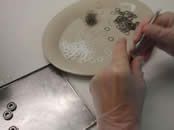Pacamor Offers Bearing Handling Practices
Bearing handling is as important as bearing design and cleanliness. Improper handling can contaminate or damage the bearing assembly. Proper handling and installation helps to maximize bearing performance and bearing life.
Some Tips:
•Bearings should be kept in their original and unopened PKB packaging until ready to use.
•Open each bearing, one at a time, as needed for installation purposes. Do not open extra bearings or expose unused bearings to the environment.
•Unused bearings should be kept in their original, protective PKB packaging.
•Bearings should be handled in a dust free environment that is clean, dry and free of static.
•Clean, lint-free garments should be worn by anyone that enters the work area.
•Fluids, solvents, and other materials that are not part of the assembly process should be kept away from the assembly area to prevent contaminating the bearings.
•Machining, filing, soldering, grinding, etc should be kept away from the assembly area to prevent contaminating the bearings.
•All tooling and instruments should be non-magnetic. It is important to keep tooling and instruments clean and properly maintained to avoid burrs or other potential contaminants.
•Bearings should be handled with specially designed hand held instruments, such as plastic tweezers or tweezers with special work tips.
•In situations where the bearings must be handled by hand, it is important that clean, dry, unused, and lint free gloves and finger cots should be utilized. Never touch the bearings with bare hands or fingers.
•Tooling and instruments should be cleaned with a spray, not sloshed in a bath of solvent. Sloshing may allow cross contamination.
•Bearings, tooling & instruments must be kept demagnetized. Should magnetism become evident, utilize a demagnetizer before exposing the bearing to the work environment.
•Any unused bearings that were removed from the PKB protective packaging should be stored in clean, dry containers, with proper identification labels. A clean anti static glass covered dish is often an acceptable storage container between work shifts.




